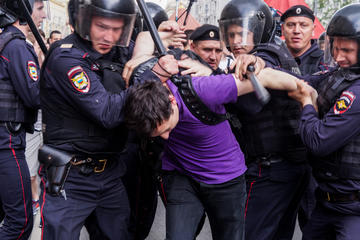
OBCT supports a coalition of eight media freedom and journalists’ organisations that are calling on Russian authorities to immediately stop the harassment of journalists who have been covering the recent protests in Moscow. The statement
Since the electoral authorities rejected several opposition candidates for September’s city council elections, protesters have taken to the streets of Moscow on four consecutive Saturdays. Russian authorities have responded with threats, violence, and detentions.
Journalists who have been reporting on the protests have consistently been targeted . On 27 July 2019, two journalists suffered broken noses after being struck by police, one received injuries to his hands and head after being hit with a police baton, a fourth was beaten in a police van after his arrest, and a fifth received injuries from a police assault.
Police have detained dozens of reporting journalists in the last few weeks, even after they had shown their accreditation. On 3 August 2019, police detained at least fourteen journalists . One journalist was arrested even after police found his accreditation and editorial assignment when they searched him. He was released shortly afterwards, but subsequently re-arrested and taken to a police station. All eight journalists were released the same day without charge.
Several YouTube channels have been broadcasting the protests live, but on 11 August the Russian communications regulator Roskomnadzor published a statement calling on YouTube to stop "advertising” the demonstrations. The regulator said that a failure to respond would be considered “interference in its sovereign affairs” and that Russia would have the right to retaliate.
Several media freedom and journalists’ organisations have filed two alerts with the Council of Europe’s Platform to Promote the Protection of Journalism and Safety of Journalists in relation to Russia’s response to the protests. No reply has so far been received from the Russian Federation.
Jessica Ní Mhainín, Policy Research and Advocacy Officer at Index on Censorship said “Russian authorities seem to be indifferent to the fact that, by targeting protesters and journalists with violence and detentions, they are in flagrant violation of their obligations under international human rights law. But they should bear in mind that their response will only fan the flames of these pro-democracy protests. Journalists are the defenders of our democracy - without journalists and media freedom, there is no democracy”.
Nora Wehofsits, Advocacy Officer at the European Centre for Press and Media Freedom said: "The violent crackdown on journalists in Russia is a violation of the freedom of the press and freedom of information. Repressing coverage on protests in favour of fair elections and against police violence – and on the oppression of those – re-affirms the need of journalists as watchdogs. It must stop”.
Ravi R. Prasad, Director of Advocacy at the International Press Institute said “Attack on journalists covering democratic protests is against the principles of democracy. The government should allow journalists to do their job without any fear of reprisal and attacks. By attacking journalists Russia is attempting to stifle press freedom and the right of its people to be informed”.
Russia is not the only country where journalists are under threat in connection with protests. Index on Censorship’s 2018 report Targeting the messenger: Journalists on the frontline of protests highlighted the challenges in European countries.
Signatories
Index on Censorship
European Centre for Press and Media Freedom (ECPMF)
Committee to Protect Journalists (CPJ)
European Federation of Journalists (EFJ)
International Press Institute (IPI)
South East Europe Media Organisation (SEEMO)
Reporters Without Borders (RSF)
Russian Journalists' and Media Workers' Union (JMWU)
This publication has been produced within the project European Centre for Press and Media Freedom, co-funded by the European Commission. The contents of this publication are the sole responsibility of Osservatorio Balcani e Caucaso and its partners and can in no way be taken to reflect the views of the European Union. The project's page

 Joint call on Russia to provide an enabling environment for journalists covering the Moscow protests
Joint call on Russia to provide an enabling environment for journalists covering the Moscow protests




 All the contents on the Osservatorio Balcani e Caucaso website are distributed with a
All the contents on the Osservatorio Balcani e Caucaso website are distributed with a 